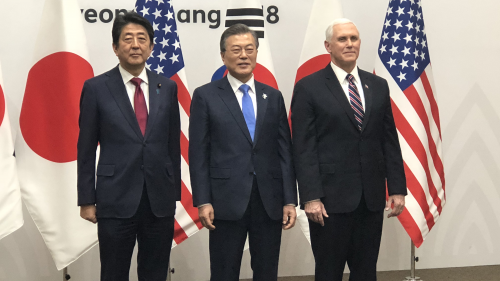Consequences of Success on the Korean Peninsula

Recent polling on South Korea's Moon Jae-in may be less encouraging than it seems.
South Korea’s Moon Jae-in should take a moment to bask in the glow of the successful summit with North Korea’s Kim Jong Un. His approval rates have spiked to 86 percent from the already lofty mid-70s, making him the most supported South Korean president at this point in his term. His meeting at the DMZ created momentum going into the upcoming summit between Donald Trump and the North’s Kim. And along the way he has outmaneuvered Korea’s long-time frenemy, Japan.
Recent Polling
But recent polling data suggests that the pageantry of the summit may have been a little too successful. (These results do have a couple of caveats; more on that later.) That success may lead the South Korean public to ask hard questions about the alliance with the United States.
Before the South-North summit began, just 15 percent of the South Korean public trusted that North Korea actually intended to denuclearize and pursue peace. That was true for conservatives (14%), moderates (12%), and even progressives (21%). It was also true across all age groups, and was lowest among those 19-29 years old (10%).
But as the summit played out, those numbers changed dramatically.
Even among conservatives—a group generally not supportive of President Moon—there was a 26 percent surge in trust in North Korea, reaching 40 percent. Among moderates, that number reached 63 percent (a 51 point gain), and among progressives it hit 84 percent (a 63 point gain). Moreover, a majority of all age groups now report trust in North Korea’s willingness to denuclearize and pursue peace.
Caveats
Now, a couple caveats. First, the numbers above are not from before and after polls. Instead, they were taken from a single poll—fielded on the day of the summit—which asked respondents about their attitudes before the summit and current attitudes while seeing the summit play out. The initial positive stagecraft of the meeting may have influenced some respondents—most likely making the trust numbers higher than they would be otherwise. Second, the question wording itself is double-barreled. The question asks about trust in North Korea’s will to pursue “denuclearization of the Korean Peninsula and a peace settlement” in one go. That makes it impossible to identify to which issue respondents are reacting.
Subsequent polls may reveal that this positive shift was temporary. But if those numbers erode only slightly, and trust in North Korea’s commitment to this process remains relatively high, it may lead the South Korean public to question who is responsible for holding up the nascent peace process on the Korean Peninsula. The most obvious answer will be the United States—especially with 67 percent holding negative views of Donald Trump. That will be especially true if the summit between Donald Trump and Kim Jong Un yields little.
President Moon has already said that he wants US forces to stay in South Korea even if a peace agreement is reached, contradicting one of his closest advisors. (It should be noted a large majority of the South Korean public continues to cite the US alliance as necessary.) But should the United States appear to be the party holding up the process, those numbers could shift quickly. And if North Korea really is intent on pursuing peace, just how necessary will the alliance continue to be to the South Korean public?
Editor’s Note: Joohyun Kwon contributed to this piece.

